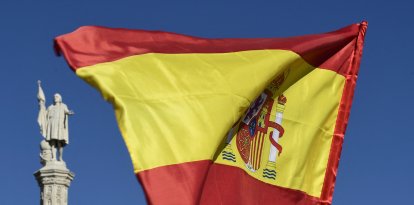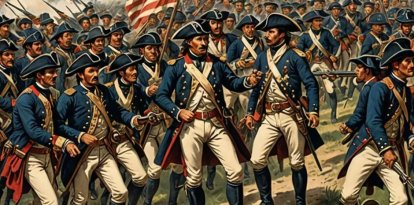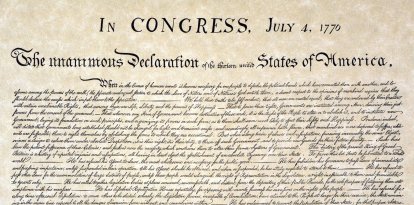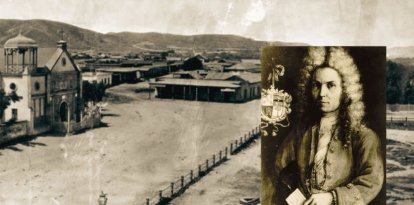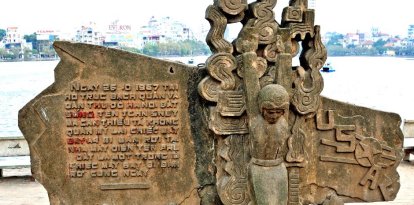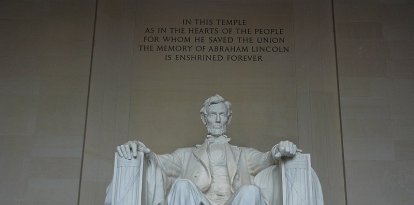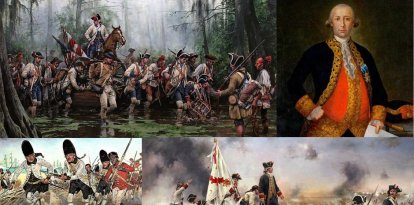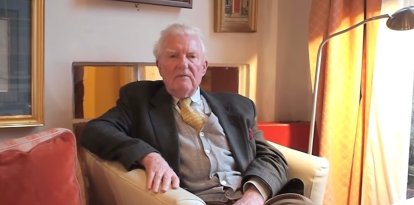Dismantling the Black Legend: Historians debunk the radical left's farce
Historians Ignacio Bracht and Iván Vélez talk to VOZ about the contributions of the Spanish Empire in America. They emphasize that Hispanidad is the demonstration of the cultural exchange between Spain and what is now known as Hispanoamerica. Civilization, Christianity and progress are some of the things that describe the process of conquest.

A Spanish flag flies near the Christopher Columbus monument.
Spain brought civilization, order and progress to America. Historians Ignacio Bracht and Ivan Velez, who spoke to VOZ about the lies of the Black Legend and the contributions of the Spanish Empire to what is now known as Spanish America, agree.
And the fact is that before the arrival of the Spaniards, there was no paradise as the radical left tries to sell. What existed was a mosaic of local societies in different degrees of technological development, almost always with relations of confrontation and subordination. In addition, of a culture that could reach barbarism with human sacrifices for pagan gods.
What there was at that time, Velez stressed, was some empires that were succeeding each other in time when the Spaniards arrived. The two main ones would be the Mexica Empire, what is now Mexico, and the Tahuantinsuyo or Inca Empire, which were based on the exploitation of other ethnic groups or other ethnic nations.
"America lacked a total idea. Here it is necessary to begin by affirming that in effect it was a discovery; that is to say, that those lands are inserted in a theory of the sphere, that is what verifies the fact of a discovery, because contacts between humans have always existed. But they must be inscribed in a global theory, never better said by the idea of globe", explained Velez.
This situation, Velez points out, generated a clash between the two cultures. This because the Spaniards found a world with zoomorphic god religions, with human sacrifices, with anthropophagy in some cases, with polygamy and with infanticide in other places.
"I say this because of what the chronicles of Peru say, the jars full of stuffed children that they found in some cases, in short, a reality incompatible in many aspects with the vision that the Spaniards of the 15th and 16th century had."
In that sense, Vélez explained that the black legend arose in the context of political and economic rivalries between Spain and other European powers, especially during the 16th and 17th centuries. Many of the negative stories were propagated by enemies ofSpain, such as England and the Netherlands, who sought to discredit the Spanish monarchy.
Contrary to what is promoted, the Spanish Empire promoted the advancement and prosperity of its viceroyalties -Spain never treated them as a colony compared to other empires in the world-. A demonstration of this impulse is that during certain periods of the Spanish Empire, some regions of Spanish America experienced remarkable development, often in economic and cultural aspects that, in some cases, surpassed those of Madrid and other Spanish cities. Likewise came order.
"What is clear is that what is built is a kind of legal monument, which are the laws of the Indies, where they try to address all the peculiar and particular problems of such a large territory, but with a kind of common substratum on both sides," he said.
He recalled that the Spanish Constitution recognized Spaniards from both hemispheres:
"When it is said about both hemispheres, it is referring to the Constitution of Cadiz, which is where the act of the Spanish nation, the political nation, is raised. It is not that Spain did not exist before, nor that it was not a nation, it was a nation of a different nature, a nation, if we want to call it somehow pre-revolutionary".
Likewise, he asserted that what was attempted, in some way, was to export the peninsular model to those lands. He detailed that if you look at the cities that have more or less preserved their classic typology, you find many similarities.
It is not about creating a pink legend. Velez acknowledged that there were mistakes on the part of the Spanish Empire during the time of the conquest. He insisted that it was neither a dark and gloomy world nor was it an Eden, thoughts he labeled "childish."
"I believe that going to the sources and cross-checking the sources and going to original documents. There you can find solvent reasons to defend the totality or the generality of the Hispanic action. Because it was not only Spanish, immediately those born in America were the ones who developed those that were not colonies at all. They were cities, with similar institutions and appearance," Vélez pointed out.
"It is estimated that 40,000 ritual sacrifices a year were practiced in the Mexica empire."
Similar was the position of historian and journalist Ignacio Bracht, who stressed that the common denominator between those who promoted the Black Legend in the past and those who do so in the present is the hatred they have for Spain.
"The Black Legend was a propaganda machine that undoubtedly had an effect and that Spain until not many years ago had assumed with guilt. What happens is that also in Spain, we see it up to the present, there are forces that are endophobic; that is to say, they hate Spain. I make clear reference, for example, to the separatists, who hate the concept of hispanidad. Hispanidad is that unique process in the history of mankind that was the cultural and blood miscegenation that gave a common worldview on one side and the other side of the Atlantic," Bracht explained.

Society
The ‘real de a ocho,’ the Spanish coin that was decisive in the independence of the United States
Williams Perdomo
The journalist also highlighted Spain's imprint in America and emphasized that the arrival of the Spanish brought to the other side of the Atlantic a culture, a religion and a language that unites millions of people around the world.
"They bequeathed, among other things, Christianity and a language, which did not cancel out the aboriginal languages. Today, Aymara, Quechua or Guarani are still spoken in many countries. But the common language that unified us and that makes us part of the same worldview, because language is the soul of a nation, was Spanish. It is a language that was spoken from Alaska to Patagonia and that today continues to be a unifying element, spoken by more than 600 million people in the world. In fact, in the United States itself, it is spoken as a second language," Bracht mentioned.
In this sense, Bracht indicated that these elements made this empire, for 300 years, with practically no large military garrisons and no large armies, to live together in peace, almost without any problems. And that in all this juridical-political and cultural structure the races were mixed.
"This assimilation on both sides of the Atlantic, between the conquering power and the countless peoples who were conquered and evangelized in the Christian faith, lead us to the conclusion that it was not an empire that subjugated. It was an empire that expanded a faith: the Christian faith. It also consummated that magnificent fact that was the cultural and blood miscegenation that gives us an identity, a worldview and a common language that we call Hispanic".
Bracht said that the Black Legend is currently being promoted by the left and "they are beginning to claim ancestral lands as native peoples. In reality there is clearly a political objective behind it because they do not recognize the Nation-State. We are talking about radicalized sectors that do not recognize the national symbols either. And one can clearly see that this is a political orchestration".
He referred directly to the president-elect of Mexico, Claudia Sheinbaum, who assured that the Spanish Empire must apologize to the indigenous peoples for the conquest:
"She would actually have to ask forgiveness, if she is self-perceived Mexica, to all the peoples that at the time the Spaniards arrived, at the time Cortés arrived in what is now Mexico, the Mexica territory was a very limited territory in Mesoamerica, but a very hardened, very expansive people that had subjugated a number of peoples. In those cultures they had anthropomorphic gods, practiced ritual sacrifice and cannibalism. This is what dismantles the whole black legend. How can one suppose that Hernán Cortés with 400 Spaniards would take Tenochtitlan, an empire or a territory inhabited by 2 million Mexica? When Hernán Cortés takes Tenochtitlan he goes in alliance with the different Mesoamerican peoples who see Cortés as the possibility of putting an end to that judgment they were suffering at the expense of the Mexica empire."
"So, the conquest of Mexico was not really carried out by the Spaniards. It was done by the Mexican people themselves, led by a group of Spaniards, who, in addition to bringing the faith of Christianity, put an end to the ritual sacrifices. It is estimated that 40,000 ritual sacrifices a year were practicedin the Mexica empire", he added.
Finally, Ignacio Bracht asserted that the way to confront the pretensions of the left to do away with the legacy of Spain in Americaand break with the historical ties that unite both hemispheres is precisely by highlighting the culture, values and traditions that unite Spain with Hispanic America.
"That is the great value that Hispanidad has and that we must reaffirm ourselves in it. Defend it. Because it is what identifies usas what we are."















